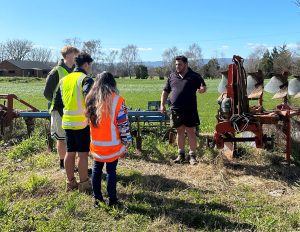“They had eyes like saucers,” is how Primary ITO | Te Pūkenga describes participants in the first-ever programme to put secondary students into a Gateway programme with rural contractors.
In late August, four pupils from two Hamilton schools visited four rural contracting businesses in the Waikato as the start of a pilot project on workplace-based training which is hoped to expand nationally as early as next year.
Primary ITO | Te Pukenga lead for Pathways into Primary Industries, Eve Williams, says the students all came from rural backgrounds or are doing ag/hort studies but still had little idea about what rural contracting involved.
“They had eyes like saucers. Just the scale and diversity of the businesses they visited and the size of the machines.”
Slattery Contracting’s Operations Manager Cameron Barrie explains cultivation to the students
The year 12 students came from Melville High School and St John’s College. She says one of the students had been considering a career in air conditioning or bricklaying before seeing the first two rural contracting businesses – Neven Granich and Slattery Contracting, both based in Matamata.
“Now, thanks to those visits, he wants a career involving big machinery.”
Primary ITO | Te Pūkenga runs Gateway schemes for hundreds of students across the country who are interested to gain work experience in farming, horticulture, viticulture and aquaculture; the Waikato pilot is the first for rural contracting.
It came about after an approach to Primary ITO by Rural Contracting NZ CEO Andrew Olsen.
“Like the rest of the rural sector, we need to attract more young people into our industry. We’ve started our own work-based training and trainee awards but were not reaching those still at school.”
For the pilot project, Andrew lined up the two Matamata businesses as well as Combined Contractors (Te Aroha) and Jackson Contracting (Morrinsville.)
Eve Williams says Primary ITO was very keen to respond. “We pulled this together pretty quickly after being contacted by Rural Contractors NZ.”
The students started their entry Level 2 course with a couple of days of classroom introduction before visiting the four rural contractors. Each of them is now being paired off with one of the businesses for one day’s work experience a week over four weeks. Before school wraps up this term, the students are expected to complete unit standards in health & safety, personal wellbeing in primary industries, applying knowledge of industry requirements and an introduction to operating machinery.
Primary ITO’s experience is that Gateway students often get offered jobs or further work experience after doing their course, says Eve.
“Things like work experience are really the best way for them to get a shot.”
She says Primary ITO operates nation-wide and did consider running the rural contracting pilot programme in mid-Canterbury but it came together first in Waikato.
That said, she is already hearing of a lot of rural contractors watching to see the results.
“I see it having real potential. There’s no reason why this couldn’t happen everywhere next year.”

